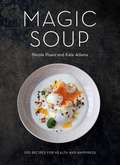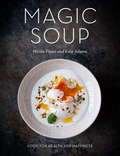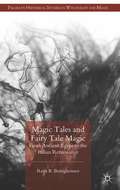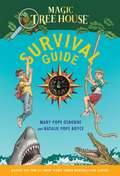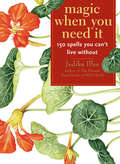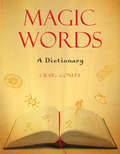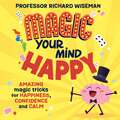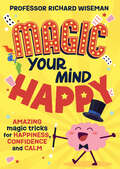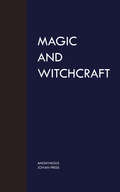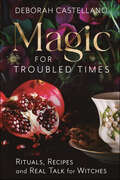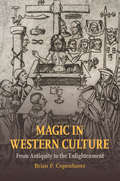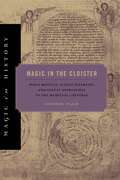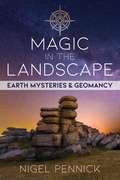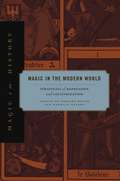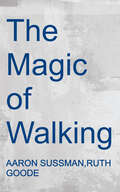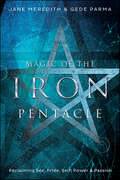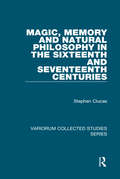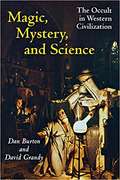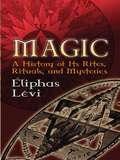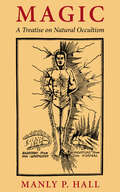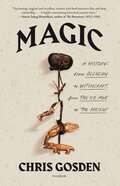- Table View
- List View
Magic Soup: 100 Recipes for Health and Happiness
by Kate Adams Nicole PisaniMore than one hundred delicious and nutritious soups that boast a unique blend of fresh ingredients and surprising spice and flavor combinations--ideal for losing weight, detoxing, or satisfying a craving for comfort--from the former head chef of Yotam Ottolenghi's renowned restaurant NOPI.There is something special about soup--it has the ability to revitalize and to soothe. A really good bowl of soup puts you in a positive frame of mind and nourishes your body--and it can be the perfect way to jumpstart weight loss. In this gorgeous four-color, fully illustrated book, Nicole Pisani and Kate Adams show that soup is a recipe for health and happiness. Magic Soup is a mouth-watering collection of more than one hundred innovative recipes for stocks and stews, hearty meals, healing bone broths, a detoxifying soup cleanse, and more. Recipes such as salmon poached in lemongrass tea, lemon chicken and mint with quinoa, and the ultimate "chicken soup for the soul" prove that soup can be a filling meal in itself. There's drool-worthy butternut squash with caramelized pear; delicious beetroot and burrata; and a robust Swedish sailors' soup made from beef and beer. In warmer months, cool down with watermelon gazpacho and fennel vichyssoise. And get healthy with nettle soup with flowers, a miso soup for each season, and the book's namesake restorative magic soup of turmeric, ginger, cardamom, cayenne, cinnamon, cumin, spinach, and seeds. Whether you're swapping a stale sandwich for a vibrant bowl of grains and greens, relaxing over a velvety blend of manuka-honeyed parsnip, cooking rib-eye pho for a feast, or nursing a cold with an Ayurvedic garlic blend--it's always the right time for soup.
Magic Soup: Food for Health and Happiness
by Kate Adams Nicole PisaniThere is something about soup that has both the ability to revitalise and to soothe. They are packed with nutrition and offer variety, deliciousness and comfort as well as being a fantastic aid for weight-loss. Soup's versatility and health benefits are captured in MAGIC SOUP.Whether it's swapping a stale sandwich at lunchtime for a vibrant bowl full of grains and greens, or relaxing at home over a velvety blend of manuka-honeyed parsnip, cooking for a supper party or nursing a cold - there is always an occasion for soup. MAGIC SOUP features over 100 innovative recipes helping you to feel fuller and become healthier. Recipes such as salmon poached in lemongrass tea, lemon chicken and mint with quinoa, and the ultimate 'chicken soup for the soul' will redefine people's expectations and put paid to the myth that soup cannot be a hearty meal in itself.Nicole Pisani and Kate Adams have all the credentials to create recipes that are utterly delicious and in line with a balanced way of eating.
Magic Soup: Food for Health and Happiness
by Kate Adams Nicole PisaniThere is something about soup that has both the ability to revitalise and to soothe. They are packed with nutrition and offer variety, deliciousness and comfort as well as being a fantastic aid for weight-loss. Soup's versatility and health benefits are captured in MAGIC SOUP.Whether it's swapping a stale sandwich at lunchtime for a vibrant bowl full of grains and greens, or relaxing at home over a velvety blend of manuka-honeyed parsnip, cooking for a supper party or nursing a cold - there is always an occasion for soup. MAGIC SOUP features over 100 innovative recipes helping you to feel fuller and become healthier. Recipes such as salmon poached in lemongrass tea, lemon chicken and mint with quinoa, and the ultimate 'chicken soup for the soul' will redefine people's expectations and put paid to the myth that soup cannot be a hearty meal in itself.Nicole Pisani and Kate Adams have all the credentials to create recipes that are utterly delicious and in line with a balanced way of eating.
Magic Tales and Fairy Tale Magic
by Ruth B. BottigheimerThis book examines magic's generally maleficent effect on humans from ancient Egypt through the Middle Ages, including tales from classical mythology, Jewish, Christian, and Muslim cultures. It shows that certain magical motifs lived on from age to age, but that it took until the Italian Renaissance for magic tales to become fairy tales.
Magic Tree House Survival Guide (Magic Tree House (R))
by Mary Pope Osborne Sal Murdocca Natalie Pope BoyceLions and tigers and bears--oh, man!Jack and Annie have survived all kinds of dangers on their adventures in the magic tree house. Find out how you can survive lots of scary situations, including sharks, earthquakes, fires, shipwrecks, and many more! With full-color photographs and illustrations, facts about real-life survival stories, and tips from Jack and Annie, this is a must-have for all survivors of the bestselling Magic Tree House series.Have more fun with Jack and Annie on the Magic Tree House® website at MagicTreeHouse.com.
Magic When You Need It
by Judika IllesMany spells and charms can take days or even weeks to complete. In Magic When You Need It, Judika Illes offers a collection of super-powered magic to help you right now. Is your career in a slump? Are you being visited by ghosts? Short on cash? Magic When You Need It can help with these problems and more. Divided into four sections: Money and Career; Love, Sex, Marriage, and Children; Home; and Trouble, Magic When You Need It offers 150 spells to help you ? nd a job, meet your soul mate, protect your home, and many more common (and not so common) predicaments. Using simple instructions and ingredients that can be found in your pantry, combined with easy to ? nd magical oils and botanicals, Illes blends Old World and modern magic to provide the reader with safe, effective magical remedies for many of life's troubles. Carry this book in your purse, your car, or keep it on your kitchen counter for accessible magic year round.
Magic Words: A Dictionary
by Craig ConleyMagic Words: A Dictionary is a oneofakind resource for armchair linguists, popculture enthusiasts, Pagans, Wiccans, magicians, and trivia nuts alike. Brimming with the most intriguing magic words and phrases from around the world and illustrated throughout with magical symbols and icons, Magic Words is a dictionary like no other. More than sevenhundred essay style entries describe the origins of magical words as well as historical and popular variations and fascinating trivia. With sources ranging from ancient Medieval alchemists to modern stage magicians, necromancers, and wizards of legend to miracle workers throughout time, Magic Words is a must have for any scholar of magic, language, history, and culture.
Magic Your Mind Happy: Amazing magic tricks for happiness, confidence and calm
by Richard WisemanFor centuries, magicians have astounded and delighted audiences with incredible illusions. But here's their biggest and best-kept secret: learning magic tricks can help you grow your confidence, feel happier, and boost your brain power!Professor Richard Wiseman, psychology professor and member of the prestigious Magic Circle, reveals the secrets behind some jaw-dropping magic tricks that will bring out the magic in YOU - and teach you some cool skills to impress your friends!Learn to defy gravity, read minds, pluck coins from thin air, make a sausage appear from nowhere AND predict the future, all while boosting your mental wellbeing, resilience and self-belief. Magic Your Mind Happy will show you how to master the awe-inspiring ancient art of performing magic, anytime, anywhere and for anyone.IT'S FUN, IT'S EASY, IT'S MAGIC!
Magic Your Mind Happy: Amazing magic tricks for happiness, confidence and calm
by Richard WisemanFor centuries, magicians have astounded and delighted audiences with incredible illusions. But here's their biggest and best-kept secret: learning magic tricks can help you grow your confidence, feel happier, and boost your brain power!Professor Richard Wiseman, psychology professor and member of the prestigious Magic Circle, reveals the secrets behind some jaw-dropping magic tricks that will bring out the magic in YOU - and teach you some cool skills to impress your friends!Learn to defy gravity, read minds, pluck coins from thin air, make a sausage appear from nowhere AND predict the future, all while boosting your mental wellbeing, resilience and self-belief. Magic Your Mind Happy will show you how to master the awe-inspiring ancient art of performing magic, anytime, anywhere and for anyone.IT'S FUN, IT'S EASY, IT'S MAGIC!
Magic and Witchcraft
by AnonymousThis book of the worthy Church-Counsellor is rather a singular one: it is not a history of Magic, but a sort of spiritual periodical, or magazine of infernal science, supported in a great measure by contributions from persons of a ghostly turn of mind, who, although they affect occasionally to write in a Sadducee vein, are many of them half-believers at heart, and would not walk through a churchyard at night, except for a consideration larger than we should like to pay. The field over which it travels is too extensive, for us to attempt to follow the author throughout his elaborate subdivisions. Dante divided hell, like Germany, into circles; and Mr. Horst, adopting something of a similar arrangement, has parcelled out the territory of the Prince of the Air into sundry regular divisions, by which its whole bearings and distances are made plain enough for the use of infant schools. It is only at one of the provinces of the Inferno, however, that we can at present afford to glance; though for those who are inclined to make the grand tour, the Counsellor may be taken as an intelligent travelling companion, well acquainted with the road. In fact his work is so methodical and distinct, and the geography of the infernal regions so clearly laid down, according to the best authorities, from Jamblichus and Porphyry down to Glanvil and the Abbé Fiard, that the whole district is now about as well known as the course of the Niger; and it must be the traveller’s own fault if he does not find his exit from Avernus as easy as its entrance has proverbially been since the days of Virgil...
Magic for Troubled Times: Rituals, Recipes, and Real Talk for Witches
by Deborah CastellanoSpells, Rituals, and Guidance for Your Transformative Journey through Troubled TimesMagic is always possible, even when it's hard to see. No matter what you're struggling with, this book can help you overcome it. Featuring gentle ways to recover and a magical plan of action, Magic for Troubled Times gives you the courage to reach the joyful times in your future.Deborah Castellano sits you down for some real talk on how to navigate difficult waters, whether you're facing a pandemic or a messy breakup. She first helps you get back on your feet, and then she guides each step forward with grounding and healing exercises, protection and money spell work, delicious recipes, and more. From luck and glamour magic to offerings and hexing, this book is full of useful strategies for both getting through the roughest parts of life and making each day better.
Magic in Western Culture
by Brian P. CopenhaverThe story of the beliefs and practices called 'magic' starts in ancient Iran, Greece, and Rome, before entering its crucial Christian phase in the Middle Ages. Centering on the Renaissance and Marsilio Ficino - whose work on magic was the most influential account written in premodern times - this groundbreaking book treats magic as a classical tradition with foundations that were distinctly philosophical. Besides Ficino, the premodern story of magic also features Plotinus, Iamblichus, Proclus, Aquinas, Agrippa, Pomponazzi, Porta, Bruno, Campanella, Descartes, Boyle, Leibniz, and Newton, to name only a few of the prominent thinkers discussed in this book. Because pictures play a key role in the story of magic, this book is richly illustrated.
Magic in the Cloister: Pious Motives, Illicit Interests, and Occult Approaches to the Medieval Universe (Magic in History)
by Sophie PageDuring the late thirteenth and early fourteenth centuries a group of monks with occult interests donated what became a remarkable collection of more than thirty magic texts to the library of the Benedictine abbey of St. Augustine's in Canterbury. The monks collected texts that provided positive justifications for the practice of magic and books in which works of magic were copied side by side with works of more licit genres. In Magic in the Cloister, Sophie Page uses this collection to explore the gradual shift toward more positive attitudes to magical texts and ideas in medieval Europe. She examines what attracted monks to magic texts, works, and how they combined magic with their intellectual interests and monastic life. By showing how it was possible for religious insiders to integrate magical studies with their orthodox worldview, Magic in the Cloister contributes to a broader understanding of the role of magical texts and ideas and their acceptance in the late Middle Ages.
Magic in the Cloister: Pious Motives, Illicit Interests, and Occult Approaches to the Medieval Universe (Magic in History)
by Sophie PageDuring the late thirteenth and early fourteenth centuries a group of monks with occult interests donated what became a remarkable collection of more than thirty magic texts to the library of the Benedictine abbey of St. Augustine's in Canterbury. The monks collected texts that provided positive justifications for the practice of magic and books in which works of magic were copied side by side with works of more licit genres. In Magic in the Cloister, Sophie Page uses this collection to explore the gradual shift toward more positive attitudes to magical texts and ideas in medieval Europe. She examines what attracted monks to magic texts, works, and how they combined magic with their intellectual interests and monastic life. By showing how it was possible for religious insiders to integrate magical studies with their orthodox worldview, Magic in the Cloister contributes to a broader understanding of the role of magical texts and ideas and their acceptance in the late Middle Ages.
Magic in the Landscape: Earth Mysteries and Geomancy
by Nigel PennickLearn to cultivate a traditional, beneficial relationship with the land by embracing the forgotten practices of our ancestors • Details the ancient art of geomancy and Earth magic, including how to work with ley lines, astrology, and the four directions to honor a space and make it a place of power • Explores the magic of the land around us and how our ancestors interacted with Earth energies and the forces of Nature • Discusses the power of boundaries and magic circles, the proper &“feng shui&” of graveyards and cemeteries, and magically powerful places such as crossroads, fairgrounds, and the mystic triangles found in &“no-man&’s lands&” Our ancestors were deeply aware of the magical power of their local landscape, no matter where they lived. Every interaction with their environment--from building to farming to the layout of ancient cities--took into account terrestrial energies, ancestral memory, and the many seen and unseen presences in Nature. They developed sophisticated procedures for orienting their living spaces and respectfully working with the magic of the landscape. Yet, much of the art of geomancy and of working with the forces of Nature has been forgotten by modern builders, architects, foresters, gardeners, and homeowners. The treatment of land as mere property has led to a loss of its meaning for those who dwell upon it. Our landscape has become disenchanted. In this book, geomancy expert and scholar Nigel Pennick details the ancient and sacred practices of geomancy and Earth magic and reveals how we can reenchant and reconnect to the sacred landscape that surrounds us, whether you live rurally, in the suburbs, or in cities. Pennick begins with a vivid look at our modern &“wasteland&” and what he calls &“the ensouled world,&” with specific examples from Britain and Iceland of our ancestors&’ way of perceiving the world they lived in. Exploring the art of geomancy, he examines how its techniques work with ley lines, astrology, and the old understanding of the four directions and the eight winds to honor a space and make it a place of power. He looks at the power of boundaries and magic circles, including laying ghosts and dismissing spirits, as well as the proper &“feng shui&” for cemeteries and graveyards. The author then takes the reader back into the traditional landscape to discuss magically powerful places, such as crossroads, the occult nature of the &“fairground,&” and the mystic triangles found in what are popularly known as &“no-man&’s lands.&” Revealing how the landscape can be reenchanted, Pennick shows how the magic of place is a living system that each of us can interact with.
Magic in the Middle Ages
by Richard KieckheferComparison of the different types of Magic used in the Middle Ages and their impact on the people. (ie Necromancy, Astrology, Science)
Magic in the Modern World: Strategies of Repression and Legitimization (Magic in History)
by Edward Bever Randall StyersThis collection of essays considers the place of magic in the modern world, first by exploring the ways in which modernity has been defined in explicit opposition to magic and superstition, and then by illuminating how modern proponents of magic have worked to legitimize their practices through an overt embrace of evolving forms such as esotericism and supernaturalism.Taking a two-track approach, this book explores the complex dynamics of the construction of the modern self and its relation to the modern preoccupation with magic. Essays examine how modern “rational” consciousness is generated and maintained and how proponents of both magical and scientific traditions rationalize evidence to fit accepted orthodoxy. This book also describes how people unsatisfied with the norms of modern subjectivity embrace various forms of magic—and the methods these modern practitioners use to legitimate magic in the modern world. A compelling assessment of magic from the early modern period to today, Magic in the Modern World shows how, despite the dominant culture’s emphatic denial of their validity, older forms of magic persist and develop while new forms of magic continue to emerge.In addition to the editors, contributors include Egil Asprem, Erik Davis, Megan Goodwin, Dan Harms, Adam Jortner, and Benedek Láng.
Magic of Walking
by Aaron Sussman Ruth GoodeA comprehensive guide to the joys of walking presents essential background information for planning and undertaking walking tours throughout the United States, the Virgin Islands, and Europe
Magic of the Iron Pentacle: Reclaiming Sex, Pride, Self, Power & Passion
by Jane Meredith Gede ParmaThe Iron Pentacle is a tool for reawakening to our essential humanity and our sovereign selves. Exploring the themes of sex, pride, self, power, and passion, this book invites you to develop magic of the body that sings to the spirit.Join authors Jane Meredith and Fio Gede Parma on an intense journey into self-awareness through practices of the Reclaiming Tradition, where each step leads to self-actualization, authenticity, and potent magic. Through personal stories and rites you can perform, Magic of the Iron Pentacle opens the door to a revolutionary concept that combines personal empowerment with magical technique. The Iron Pentacle evokes qualities neglected and disparaged—yet these qualities, together and in balance, enliven our magic and our lives.
Magic, Memory and Natural Philosophy in the Sixteenth and Seventeenth Centuries (Variorum Collected Studies)
by Stephen ClucasThis collection of Stephen Clucas's articles addresses the complex interactions between religion, natural philosophy and magic in sixteenth- and seventeenth-century Europe. The essays on the Elizabethan mathematician and magus John Dee show that the angelic conversations of John Dee owed a significant debt to medieval magical traditions and how Dee's attempts to communicate with spirits were used to serve specific religious agendas in the mid-seventeenth century. The essays devoted to Giordano Bruno offer a reappraisal of the magical orientation of the Italian philosopher's mnemotechnical and Lullist writings of the 1580s and 90s and show his influence on early seventeenth-century English understandings of memory and intellection. Next come three studies on the atomistic or corpuscularian natural philosophy of the Northumberland and Cavendish circles, arguing that there was a distinct English corpuscularian tradition prior to the Gassendian influence in the 1640s and 50s. Finally, two essays on the seventeenth-century Intelligencer Samuel Hartlib and his correspondents shows how religion alchemy and natural philosophy interacted during the 'Puritan Revolution'.
Magic, Mystery, And Science: The Occult In Western Civilization
by Danny Ethus Burton David A. Grandy"[P.D. Ouspensky's] yearning for a transcendent, timeless reality—one that cancels out physical disintegration and death—figures into science at some fundamental level. <P><P> Einstein found solace in his theory of relativity, which suggested to him that events are ever-present in the space-time continuum. When his friend Michele Besso passed on shortly before his own death, he wrote: 'For us believing physicists the distinction between past, present, and future is only an illusion, even if a stubborn one.'" —from Magic, Mystery, and Science <P><P> The triumph of science would appear to have routed all other explanations of reality. No longer does astrology or alchemy or magic have the power to explain the world to us. Yet at one time each of these systems of belief, like religion, helped shed light on what was dark to our understanding. Nor have the occult arts disappeared. We humans have a need for mystery and a sense of the infinite. <P><P> Magic, Mystery, and Science presents the occult as a "third stream" of belief, as important to the shaping of Western civilization as Greek rationalism or Judeo-Christianity. The occult seeks explanations in a world that is living and intelligent—quite unlike the one supposed by science. By taking these beliefs seriously, while keeping an eye on science, this book aims to capture some of the power of the occult. Readers will discover that the occult has a long history that reaches back to Babylonia and ancient Egypt. It proceeds alongside, and frequently mingles with, religion and science. From the Egyptian Book of the Dead to New Age beliefs, from Plato to Adolf Hitler, occult ways of knowing have been used—and hideously abused—to explain a world that still tempts us with the knowledge of its dark secrets.
Magic, Science, and Civilization
by Jacob BronowskiA compilation of a series of lectures detailing such varied topics as nature, magic and human civilization.
Magic: A History of Its Rites, Rituals, and Mysteries
by A. E. Waite Éliphas Lévi"The most arresting, entertaining, and brilliant of all studies on the subject." — Arthur Edward WaiteA great work of literature as well as a pioneering classic of occultism, this voluminous historical survey traces the roots and manifestations of magic through the ages as a secret tradition persisting from remote times. Author Éliphas Lévi, pseudonym of Alphonse Louis Constant (1810-75), was a leader of the French occult revival, a spiritual teacher and magus who is today considered by some to be a founding father of the New Age movement. One of his most stunning (and original) revelations connects the Kabbalah with the Tarot, thus helping to inspire the ongoing fascination with the symbols of both, and their correspondences with each other. In this 1860 work, Lévi's discussions include topics that continue to intrigue modern readers, subjects as seemingly disparate as the mathematical magic of Pythagoras, magical monuments, magic and Christianity, the devil, the Knights Templar, alchemy, the illuminati, hallucinations, and many others that are equally alluring.The first part of the book explains the principles underlying magical operations, while the second part addresses the actual ritual and practice of transcendent magic. An essential resource for the library of anyone interested in mysticism and the occult sciences, this influential work appears here in its first English translation (from the original French) by the distinguished scholar and co-creator of the Rider-Waite Tarot deck, A. E. Waite.
Magic: A Treatise on Natural Occultism
by Manly Palmer HallIn this short work by the noted lecturer and mystic, Manly P. Hall explores the differences between black and white magic, guiding fellow occultists away from those practices which damage the spirit and lead to the loss of the soul. An essential part of any occultist's library.
Magic: From Alchemy to Witchcraft, from the Ice Age to the Present
by Chris GosdenAn Oxford professor of archaeology explores the unique history of magic—the oldest and most neglected strand of human behavior and its resurgence today Three great strands of belief run through human history: Religion is the relationship with one god or many gods, masters of our lives and destinies. Science distances us from the world, turning us into observers and collectors of knowledge. And magic is direct human participation in the universe: we have influence on the world around us, and the world has influence on us.Over the last few centuries, magic has developed a bad reputation—thanks to the unsavory tactics of shady practitioners, and to a successful propaganda campaign on the part of religion and science, which denigrated magic as backward, irrational, and "primitive." In Magic, however, the Oxford professor of archaeology Chris Gosden restores magic to its essential place in the history of the world—revealing it to be an enduring element of human behavior that plays an important role for individuals and cultures. From the curses and charms of ancient Greek, Roman, and Jewish magic, to the shamanistic traditions of Eurasia, indigenous America, and Africa; from the alchemy of the Renaissance to the condemnation of magic in the colonial period and the mysteries of modern quantum physics—Gosden's startling, fun, and colorful history supplies a missing chapter of the story of our civilization. Drawing on decades of research around the world—touching on the first known horoscope, a statue ordered into exile, and the mystical power of tattoos—Gosden shows what magic can offer us today, and how we might use it to rethink our relationship with the world. Magic is an original, singular, and sweeping work of scholarship, and its revelations will leave a spell on the reader.
